
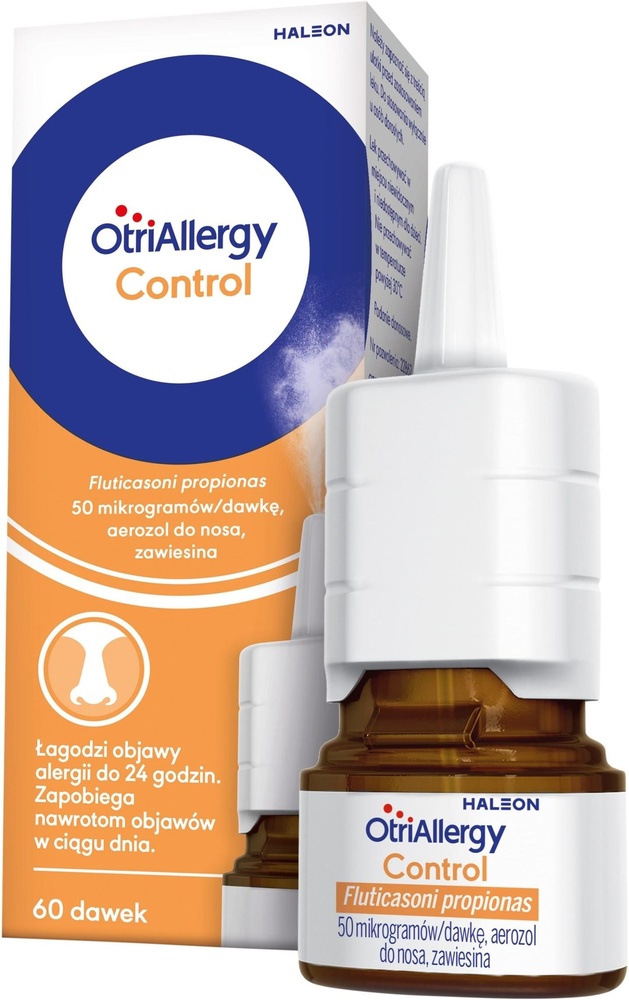
Otriallergi Control

Ask a doctor about a prescription for Otriallergi Control

How to use Otriallergi Control
OtriAllergy Control Medication is used for symptomatic treatment, diagnosed by
a doctor, of allergic rhinitis.
Before using the medication, you should carefully read the leaflet and
use the diagnostic tool located at the end of this leaflet.
This information is available in pharmacies and on the website: otriallergycontrol.pl.
Leaflet attached to the packaging: patient information
OtriAllergy Control
50 micrograms/dose, nasal spray, suspension
Fluticasone propionate
You should carefully read the contents of the leaflet before using the medication, as it contains important information for the patient.
This medication should always be used exactly as described in this patient leaflet or as advised by
your doctor, pharmacist, or nurse.
- You should keep this leaflet, so you can read it again if you need to.
- If you need advice or additional information, you should consult a pharmacist.
- If the patient experiences any side effects, including any side effects not listed in this leaflet, they should inform their doctor, pharmacist, or nurse. See section 4.
- If after 7 days there is no improvement or the patient feels worse, they should contact their doctor.
Table of contents of the leaflet
- 1. What is OtriAllergy Control and what is it used for
- 2. Important information before using OtriAllergy Control
- 3. How to use OtriAllergy Control
- 4. Possible side effects
- 5. How to store OtriAllergy Control
- 6. Contents of the packaging and other information
1. What is OtriAllergy Control and what is it used for
The active substance of the medication is fluticasone propionate, which belongs to the group of corticosteroid medications,
which, when used daily, reduces inflammation. This medication helps control the body's reaction
to allergens (factors that trigger an allergic reaction) in the environment.
OtriAllergy Control is used in adults aged 18 and over to treat symptoms of
allergic rhinitis caused by plant pollen (hay fever) or other allergens in the air, such as dust mites, mold spores, or pet dander.
Within 24 hours of use, the medication alleviates symptoms such as: sneezing, itching and tearing of the eyes, nasal discharge, itching, and a stuffy nose.
Maximum therapeutic effect may occur after 3-4 days of continuous therapy. Therefore, to achieve full therapeutic benefits, regular use of the medication is recommended.
Treatment should only be used during the period of exposure to the allergen.
If after 7 days there is no improvement or the patient feels worse, they should consult their doctor.
2. Important information before using OtriAllergy Control
When not to use OtriAllergy Control:
Warnings and precautions
Before starting to use OtriAllergy Control, you should discuss it with your doctor or pharmacist
in the following cases:
- concomitant use of other medications containing corticosteroids (creams for eczema, asthma medications, tablets, injections, nasal sprays, or eye drops),
- nasal or sinus infections, colds, high fever, recent injuries or surgery in the nose, or ulcers of the nasal mucosa.
If after 7 days there is no improvement, you should contact your doctor.
Without consulting a doctor, you should not use OtriAllergy Control for more than 3 months.
If you experience blurred vision or other vision disturbances that may be caused by conditions such as cataracts or glaucoma, you should contact your doctor.
Systemic effects may occur when using nasal corticosteroids, especially if large doses are used for a long time. The occurrence of systemic effects is much less likely than with oral corticosteroids and may vary between patients and with different corticosteroids. Possible systemic effects include: Cushing's syndrome, Cushingoid features, adrenal suppression, growth retardation in children and adolescents, and, less frequently, decreased bone mineral density, disturbances in glucose metabolism, and a range of psychiatric or behavioral changes, including excessive psychomotor activity, sleep disturbances, anxiety, depression, or aggression (especially in children).
Using nasal corticosteroids in higher doses than recommended may cause clinically significant adrenal suppression. If a patient uses higher doses of the medication than recommended, the doctor may consider additional administration of systemic corticosteroids during periods of stress or before scheduled surgery.
OtriAllergy Control and other medications
You should tell your doctor or pharmacist about all medications you are currently taking or have recently taken, as well as any medications you plan to take, including those available without a prescription.
This is especially important if you are taking medications such as:
- medications containing corticosteroids (including creams and ointments for eczema and asthma medications: tablets, injections, nasal sprays, or eye drops),
- ritonavir and cobicistat (medications used to treat HIV),
- ketoconazole (a medication used to treat fungal infections).
Some medications may enhance the effect of OtriAllergy Control, and your doctor may recommend close monitoring of these medications (including certain HIV medications: ritonavir, cobicistat).
Using OtriAllergy Control with food and drink
The medication can be used at any time of day, with or without food and drink.
Pregnancy, breastfeeding, and fertility
If you are pregnant or breastfeeding, think you may be pregnant, or plan to have a baby, you should consult your doctor or pharmacist before using this medication.
There is no available data on the effect of OtriAllergy Control on fertility.
Driving and using machines
No effects of OtriAllergy Control on the ability to drive or use machines have been observed.
The medication contains benzalkonium chloride
This medication contains 0.02 mg of benzalkonium chloride per dose of nasal spray, which corresponds to 0.2 mg of benzalkonium chloride per 1 ml of solution.
Benzalkonium chloride may cause irritation or swelling inside the nose, especially with prolonged use.
3. How to use OtriAllergy Control
This medication should always be used exactly as described in this patient leaflet or as advised by
your doctor, pharmacist, or nurse. If you are unsure, you should consult your doctor, pharmacist, or nurse.
Adults aged 18 and over
It is recommended to use two doses of nasal spray in each nostril once a day
(200 micrograms of fluticasone propionate), preferably in the morning.
After achieving adequate control of symptoms, the dose can be reduced to one dose of nasal spray in each nostril once a day.
In case of acute symptoms, the dose can be increased to two doses of nasal spray in each nostril twice a day, but only for a short time.
- You should not use more than four doses of nasal spray in each nostril per day.
- You should use the smallest dose that provides effective control of symptoms.
- If after 7 days there is no improvement or adequate control of symptoms, you should consult your doctor or pharmacist.
- Treatment should only be used during the period of exposure to the allergen.
- You should not use a higher dose than recommended.
- Without consulting a doctor, you should not use the medication for more than 3 months.
Children and adolescents
OtriAllergy Control nasal spray is not recommended for use in children and adolescents under 18 years of age.
Elderly patients
Dosing is the same as for adult patients.
Method of administration
The medication is for nasal use only.
The medication should not be used in the eyes or mouth.
The medication should not be swallowed.
Before using OtriAllergy Control:
OtriAllergy Control has a cap that protects the actuator and allows it to be kept clean. Before use, the cap should be removed (Figure 1).
If OtriAllergy Control is used for the first time or if it has not been used for a long time, it should be prepared for use to ensure that the full dose of the medication is administered.
Place your index and middle fingers on either side of the actuator and your thumb underneath the bottle. Holding your thumb still, press the actuator several times until a fine mist is produced (Figure 2). Do not point the actuator at yourself or others.
If the actuator does not work properly, it should be cleaned as described in the "Cleaning the cap and actuator" section. Do not use a needle or other sharp object to restore the actuator's functionality, as this may damage the actuator mechanism.
Figure 1
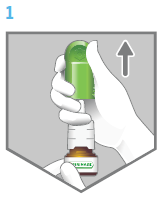
Figure 2
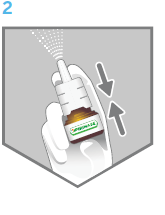
Using OtriAllergy Control:
- 1. Gently blow your nose.
- 2. Shake the container gently and remove the cap.
- 3. If OtriAllergy Control is used for the first time or if it has not been used for a long time, the actuator should be prepared for use by pressing the actuator several times until a fine mist is produced.
- 4. Hold the container as shown in Figure 3. Block one nostril with your finger and insert the actuator into the other nostril. Tilt your head slightly forward and hold the actuator upright, as shown in Figure 4. The actuator should be directed towards the outer side of the nose, slightly away from the nasal septum.
- 5. Breathe in through your nose and, while inhaling strongly, press the actuator to deliver the dose of medication into your nose.
- 6. Exhale through your mouth, as shown in Figure 5.
- 7. Repeat steps 4 and 5 to administer a second dose of medication to the same nostril.
- 8. Repeat steps 4, 5, and 6 to administer the medication to the other nostril.
- 9. After administering the doses of nasal spray, wipe the actuator with a clean cloth or tissue and replace the cap.
Figure 3
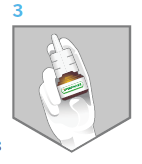
Figure 4
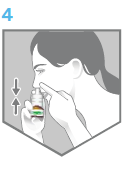
Figure 5
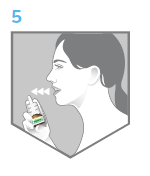
Cleaning the cap and actuator:
- 1. Remove the cap and actuator (Figure 6).
- 2. Soak the cap and actuator in warm water for a few minutes (Figure 7), then rinse under running water (Figure 8).
- 3. Shake off excess water from the cap and actuator and let them dry in a warm place. Do not dry in high temperatures.
- 4. Replace the actuator on the container (Figure 9).
- 5. If necessary, press the actuator several times until a fine mist is produced. Replace the cap on the container.
- 6. Do not use a needle or other sharp object to restore the actuator's functionality, as this may damage the actuator mechanism.
Figure 6, 7, 8, 9
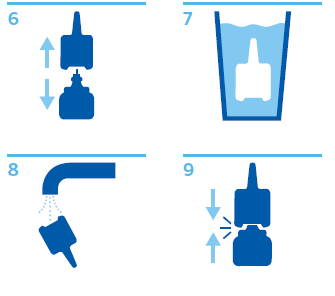
Maximum therapeutic effect of OtriAllergy Control may occur after 3-4 days of therapy. To prevent the occurrence of symptoms, use of OtriAllergy Control should be started before the expected period of exposure to the allergen.
OtriAllergy Control should only be used during the period of exposure to the allergen (e.g., pollen).
Using a higher dose of OtriAllergy Control than recommended
In case of using a higher dose of OtriAllergy Control than recommended, you should consult your doctor.
Missing a dose of OtriAllergy Control
In case of missing a dose, you should take the next planned dose. You should not take a double dose of the medication to make up for the missed dose.
If you have any further doubts about using this medication, you should consult your doctor or pharmacist or nurse.
4. Possible side effects
Like all medications, OtriAllergy Control can cause side effects, although not everybody gets them.
When using nasal corticosteroids, especially if used in large doses for a long time, systemic effects may occur.
Some side effects can be serious.
You should contact your doctor immediately if you experience the following serious side effects (very rare):
- symptoms of an allergic reaction, such as rash, swelling in the mouth or face, difficulty breathing
- new vision disturbances that occur after starting to use this medication. Rare cases of vision disturbances, such as cataracts or glaucoma, have been reported in patients using corticosteroids in large quantities for several years
- perforation (damage) of the nasal septum
- eye problems, such as pain
Side effects with unknown frequency(frequency cannot be estimated from available data)
- blurred vision
- ulceration of the nasal mucosa
If you experience any of these symptoms, you should stop using the medication and consult your doctor immediately.
Other side effects:
Very common side effects(may occur in more than 1 in 10 people)
- occasional nosebleeds.
Common side effects(may occur in less than 1 in 10 people)
- sneezing, which resolves on its own
- unpleasant taste or smell
- dryness or irritation of the nose or throat
- headache
Rare side effects(may occur in less than 1 in 10,000 people)
- pain and (or) bleeding from the nose
- increased intraocular pressure
If you experience any of these symptoms, you should stop using the medication and consult your doctor.
Reporting side effects
If you experience any side effects, including any side effects not listed in this leaflet, you should inform your doctor, pharmacist, or nurse.
Side effects can be reported directly to the Department of Adverse Reaction Monitoring of Medicinal Products, Medical Devices, and Biocidal Products: Al. Jerozolimskie 181C, 02-222 Warsaw, tel.: + 48 22 49 21 301, fax: + 48 22 49 21 309, website: https://smz.ezdrowie.gov.pl.
Side effects can also be reported to the marketing authorization holder.
Reporting side effects will help to gather more information on the safety of this medication.
5. How to store OtriAllergy Control
The medication should be stored out of sight and reach of children.
You should not use this medication after the expiry date stated on the packaging after: Expiry Date (EXP). The expiry date refers to the last day of the month stated.
You should not store the medication at temperatures above 30°C.
Medications should not be disposed of via wastewater or household waste. You should ask your pharmacist how to dispose of medications that are no longer needed. This will help protect the environment.
6. Contents of the packaging and other information
What OtriAllergy Control contains
- The active substance of the medication is: fluticasone propionate. One dose of nasal spray delivers 100 mg of suspension containing 50 micrograms of fluticasone propionate.
- Other ingredients are: glucose (anhydrous), microcrystalline cellulose, sodium carmellose, phenylethyl alcohol, benzalkonium chloride, polysorbate 80, and purified water.
What OtriAllergy Control looks like and contents of the packaging
OtriAllergy Control is a nasal spray, a white, opaque, aqueous suspension.
The brown glass bottle is equipped with a dosing pump consisting of an applicator made of PP and a cap made of PP, in a cardboard box.
One bottle contains 60 doses of nasal spray; total content not less than 7.0 g or 120 doses of nasal spray; total content not less than 14.0 g.
Marketing authorization holder
Haleon Poland Sp. z o.o.
ul. Rzymowskiego 53
02-697 Warsaw
tel. 800 702 849
Manufacturer
Glaxo Wellcome SA
Avda. Extremadura, 3
Pol. Ind. Allendeduero, Aranda de Duero
09400 Burgos
Spain
Importer
Haleon Germany GmbH
Barthstraße 4
80339 Munich
Germany
This medicinal product is authorized in the Member States of the European Economic Area under the following names:
Belgium
Otrivine Anti-Allergie 50 micrograms/dose, suspension pour pulvérisation nasale
Estonia Flixonase, 50 mikrogrammi/pihustuses ninasprei, suspensioon
Ireland
Fluticasone propionate 50 micrograms/actuation, nasal spray, suspension
Latvia
Flixonase 50 mikrogrami/ izsmidzinājumā deguna aerosols, suspensija
Luxembourg Otrivine Anti-Allergie 50 micrograms/dose, suspension pour pulvérisation nasale
Netherlands Flixonase Haleon 50 microgram/dosis, neusspray, suspensie
Norway
Otrason 50 mikrogram/dose nesespray, suspensjon
Portugal
Vibrocil Anti-Alergias 50 µg/dose Suspensão para pulverização nasal
Romania
Vibrocil Alergii 50 micrograme/doza spray nazal, suspensie
Spain
Rhinovin Alergia 50 microgramos/pulverización suspensión para pulverización
Nasal
Hungary Flixonase Allergia 50 mikrogramm/adag szuszpenziós orrspray
United Kingdom Fluticasone propionate 50 micrograms/actuation, nasal spray, suspension
(Northern Ireland)
Date of last revision of the leaflet: November 2024
Detailed information about this medication is available on the website of the Office for Registration of Medicinal Products, Medical Devices, and Biocidal Products.
DIAGNOSTIC TOOL FOR THE MEDICINAL PRODUCT
OTRIALLERGY CONTROL
WARNING!
OtriAllergy Control is used to treat symptoms of
allergic rhinitiscaused by plant pollen (hay fever) or other allergens in the air (such as dust mites, mold spores, or pet dander).
IF THE PATIENT DOES NOT MEET AT LEAST ONE OF THE FOLLOWING CONDITIONS, THEY SHOULD NOT USE THIS MEDICATION!
- 1.a
Has the doctor diagnosed the patient with hay fever or allergic rhinitis caused by plant pollen or other allergens in the air (such as dust mites, mold spores, or pet dander)?
- 1.b
Can the patient distinguish between allergy symptoms and a cold or flu on their own?
2 x YES
in response to questions 1a and 1b
2 x NO or 1x NO
in response to questions 1a and 1b
Proceed to the next
questions of the Diagnostic Tool
NO, you should not use OtriAllergy Control without consulting a doctor.
- 2. Are you currently using:
- medications containing corticosteroids(including creams and ointments for eczema and asthma medications: tablets, injections, nasal sprays, or eye drops)
- ritonavir and cobicistat(medications used to treat HIV)
- ketoconazole(a medication used to treat fungal infections)
- 3. Do you currently have:
- symptoms of nasal or sinus infections
- symptoms of a cold
- high fever
- 4. Does any of the following apply to you?
- recent surgery in the nose
- recent nasal injury
- ulceration of the nasal mucosa
- 5. Are you pregnant, think you may be pregnant, or plan to become pregnant, or are you breastfeeding?
- 6. Are you using OtriAllergy Control or another nasal corticosteroid continuously for more than 3 months?
At least 1x YES in
response to questions 2-6
YES, you can use OtriAllergy Control
NO, you should not use OtriAllergy Control without consulting a doctor.
Warning!Maximum therapeutic effect may occur after 3-4 days of continuous therapy with OtriAllergy Control. Therefore, to achieve full therapeutic benefits, regular use of the medication is recommended. If, however, after 7 days there is no improvement or you feel worse,
you should contact your doctor!
- Country of registration
- Active substance
- Prescription requiredNo
- ImporterGlaxo Wellcome S.A. Haleon Germany GmbH
- This information is for reference only and does not constitute medical advice. Always consult a licensed doctor before taking any medication. Oladoctor is not responsible for medical decisions based on this content.
- Alternatives to Otriallergi ControlDosage form: Aerosol, 50 mcg/nasal doseActive substance: fluticasonePrescription requiredDosage form: Drops, 400 mcg/nasal doseActive substance: fluticasonePrescription requiredDosage form: Aerosol, 50 mcg/dose inh.Active substance: fluticasonePrescription required
Alternatives to Otriallergi Control in other countries
The best alternatives with the same active ingredient and therapeutic effect.
Alternative to Otriallergi Control in Ukraine
Alternative to Otriallergi Control in Spain
Online doctors for Otriallergi Control
Discuss dosage, side effects, interactions, contraindications, and prescription renewal for Otriallergi Control – subject to medical assessment and local rules.








